An In-Depth Essay on Dementia: Symptoms, Treatments, and Patient Care
VerifiedAdded on 2022/09/07
|11
|2907
|26
Essay
AI Summary
This essay provides a comprehensive overview of dementia, encompassing its various aspects from symptoms and diagnosis to treatment and care strategies. It begins by defining dementia and outlining its major symptoms, such as memory loss, communication difficulties, and behavioral changes. The essay then delves into diagnostic methods, including neurological exams and brain imaging tests, while also discussing the importance of observing behavioral changes. It explores various therapeutic approaches, emphasizing that while there is no cure, certain medications can help manage symptoms. Furthermore, the essay covers statistical data related to dementia, guidelines for care professionals and personal carers, and strategies for dealing with aggression and behavioral changes in patients. Nutritional requirements, person-centered dementia care, and end-of-life care considerations are also discussed. Finally, the essay addresses the topic of dementia and restraint, highlighting safety concerns and the importance of providing comfort and security for patients. The essay emphasizes the need for empathetic care and understanding in managing this complex condition.

Essay on dementia
Paraphrase This Document
Need a fresh take? Get an instant paraphrase of this document with our AI Paraphraser
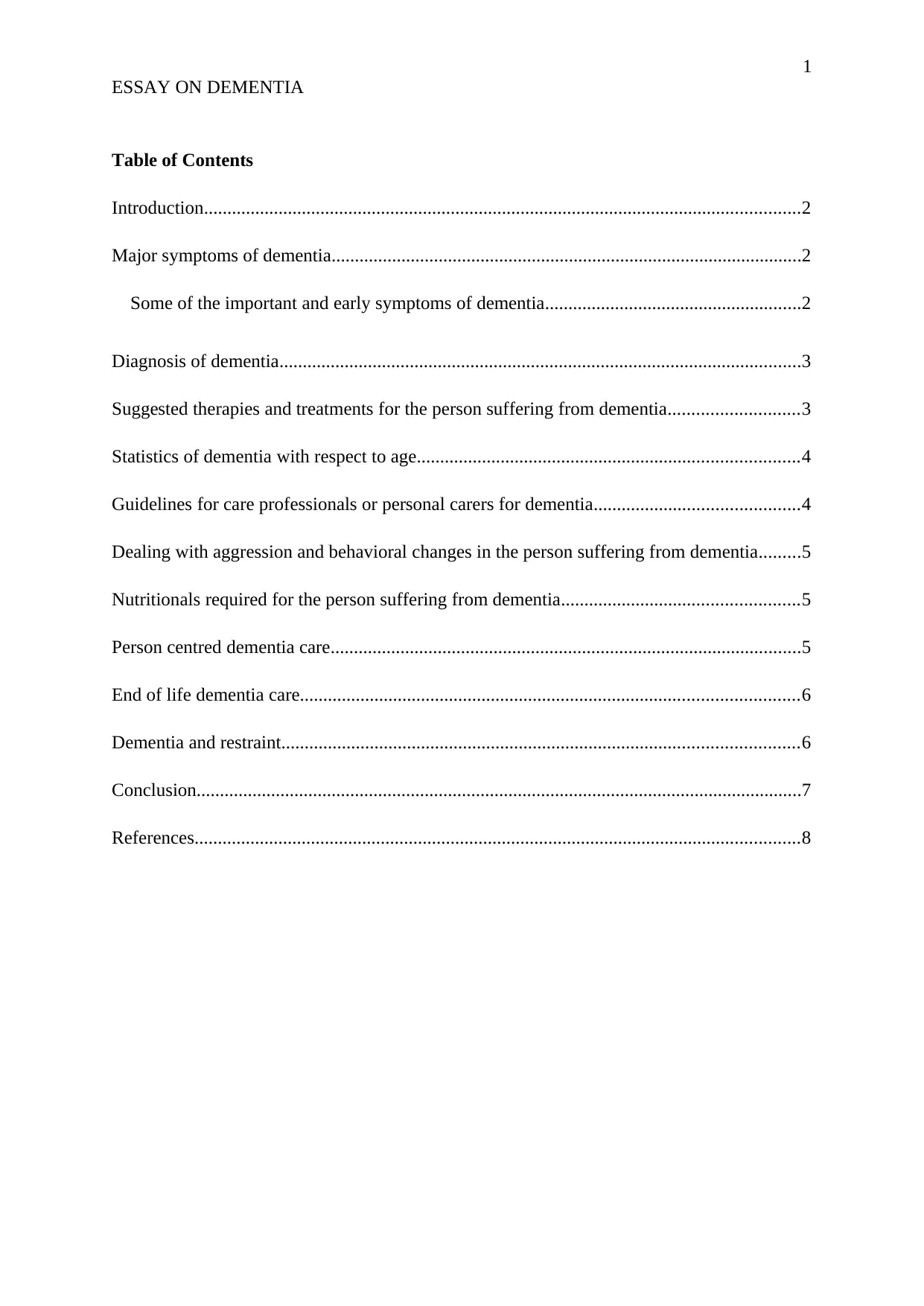
1
ESSAY ON DEMENTIA
Table of Contents
Introduction................................................................................................................................2
Major symptoms of dementia.....................................................................................................2
Some of the important and early symptoms of dementia.......................................................2
Diagnosis of dementia................................................................................................................3
Suggested therapies and treatments for the person suffering from dementia............................3
Statistics of dementia with respect to age..................................................................................4
Guidelines for care professionals or personal carers for dementia............................................4
Dealing with aggression and behavioral changes in the person suffering from dementia.........5
Nutritionals required for the person suffering from dementia...................................................5
Person centred dementia care.....................................................................................................5
End of life dementia care...........................................................................................................6
Dementia and restraint...............................................................................................................6
Conclusion..................................................................................................................................7
References..................................................................................................................................8
ESSAY ON DEMENTIA
Table of Contents
Introduction................................................................................................................................2
Major symptoms of dementia.....................................................................................................2
Some of the important and early symptoms of dementia.......................................................2
Diagnosis of dementia................................................................................................................3
Suggested therapies and treatments for the person suffering from dementia............................3
Statistics of dementia with respect to age..................................................................................4
Guidelines for care professionals or personal carers for dementia............................................4
Dealing with aggression and behavioral changes in the person suffering from dementia.........5
Nutritionals required for the person suffering from dementia...................................................5
Person centred dementia care.....................................................................................................5
End of life dementia care...........................................................................................................6
Dementia and restraint...............................................................................................................6
Conclusion..................................................................................................................................7
References..................................................................................................................................8
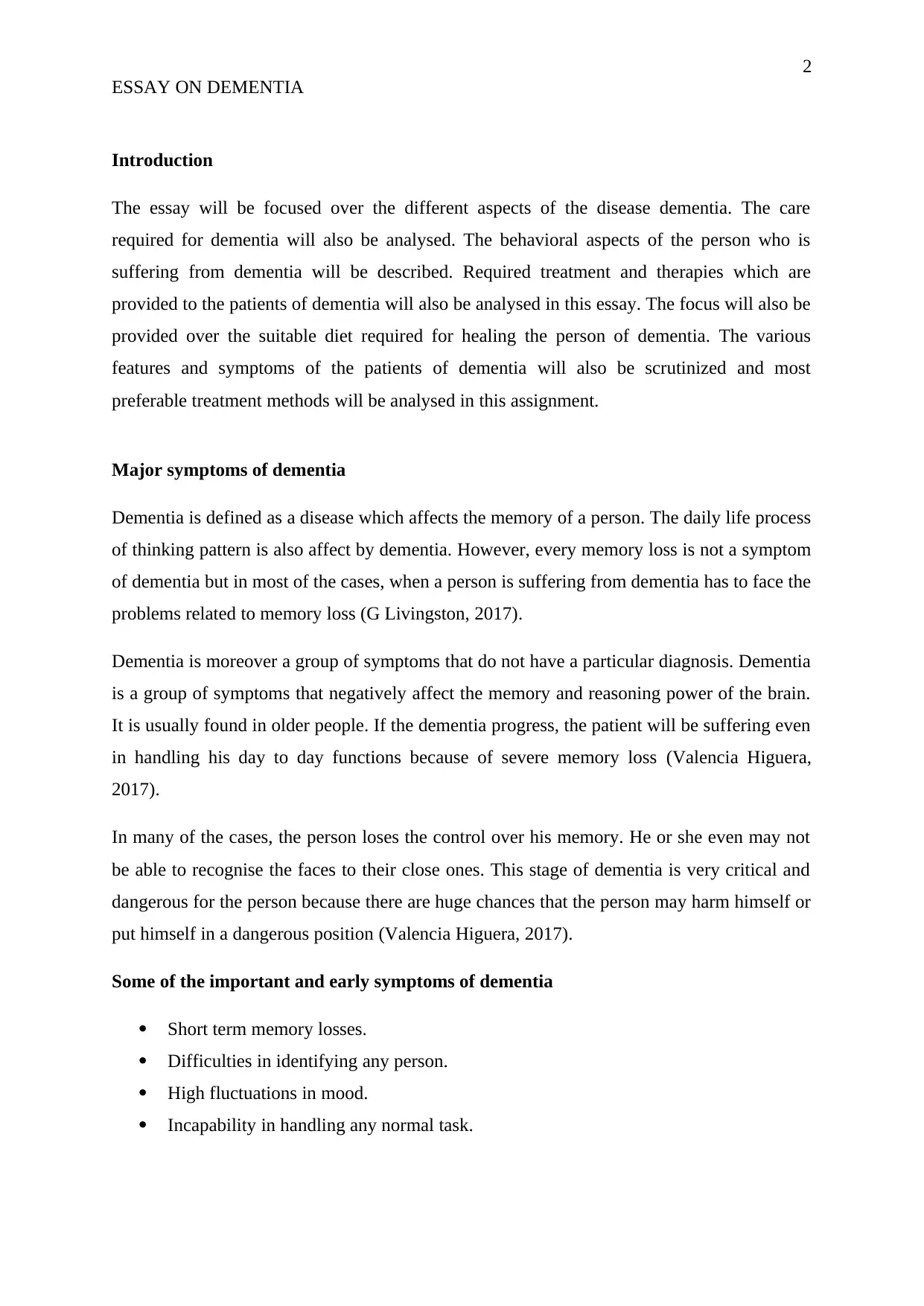
2
ESSAY ON DEMENTIA
Introduction
The essay will be focused over the different aspects of the disease dementia. The care
required for dementia will also be analysed. The behavioral aspects of the person who is
suffering from dementia will be described. Required treatment and therapies which are
provided to the patients of dementia will also be analysed in this essay. The focus will also be
provided over the suitable diet required for healing the person of dementia. The various
features and symptoms of the patients of dementia will also be scrutinized and most
preferable treatment methods will be analysed in this assignment.
Major symptoms of dementia
Dementia is defined as a disease which affects the memory of a person. The daily life process
of thinking pattern is also affect by dementia. However, every memory loss is not a symptom
of dementia but in most of the cases, when a person is suffering from dementia has to face the
problems related to memory loss (G Livingston, 2017).
Dementia is moreover a group of symptoms that do not have a particular diagnosis. Dementia
is a group of symptoms that negatively affect the memory and reasoning power of the brain.
It is usually found in older people. If the dementia progress, the patient will be suffering even
in handling his day to day functions because of severe memory loss (Valencia Higuera,
2017).
In many of the cases, the person loses the control over his memory. He or she even may not
be able to recognise the faces to their close ones. This stage of dementia is very critical and
dangerous for the person because there are huge chances that the person may harm himself or
put himself in a dangerous position (Valencia Higuera, 2017).
Some of the important and early symptoms of dementia
Short term memory losses.
Difficulties in identifying any person.
High fluctuations in mood.
Incapability in handling any normal task.
ESSAY ON DEMENTIA
Introduction
The essay will be focused over the different aspects of the disease dementia. The care
required for dementia will also be analysed. The behavioral aspects of the person who is
suffering from dementia will be described. Required treatment and therapies which are
provided to the patients of dementia will also be analysed in this essay. The focus will also be
provided over the suitable diet required for healing the person of dementia. The various
features and symptoms of the patients of dementia will also be scrutinized and most
preferable treatment methods will be analysed in this assignment.
Major symptoms of dementia
Dementia is defined as a disease which affects the memory of a person. The daily life process
of thinking pattern is also affect by dementia. However, every memory loss is not a symptom
of dementia but in most of the cases, when a person is suffering from dementia has to face the
problems related to memory loss (G Livingston, 2017).
Dementia is moreover a group of symptoms that do not have a particular diagnosis. Dementia
is a group of symptoms that negatively affect the memory and reasoning power of the brain.
It is usually found in older people. If the dementia progress, the patient will be suffering even
in handling his day to day functions because of severe memory loss (Valencia Higuera,
2017).
In many of the cases, the person loses the control over his memory. He or she even may not
be able to recognise the faces to their close ones. This stage of dementia is very critical and
dangerous for the person because there are huge chances that the person may harm himself or
put himself in a dangerous position (Valencia Higuera, 2017).
Some of the important and early symptoms of dementia
Short term memory losses.
Difficulties in identifying any person.
High fluctuations in mood.
Incapability in handling any normal task.
⊘ This is a preview!⊘
Do you want full access?
Subscribe today to unlock all pages.

Trusted by 1+ million students worldwide
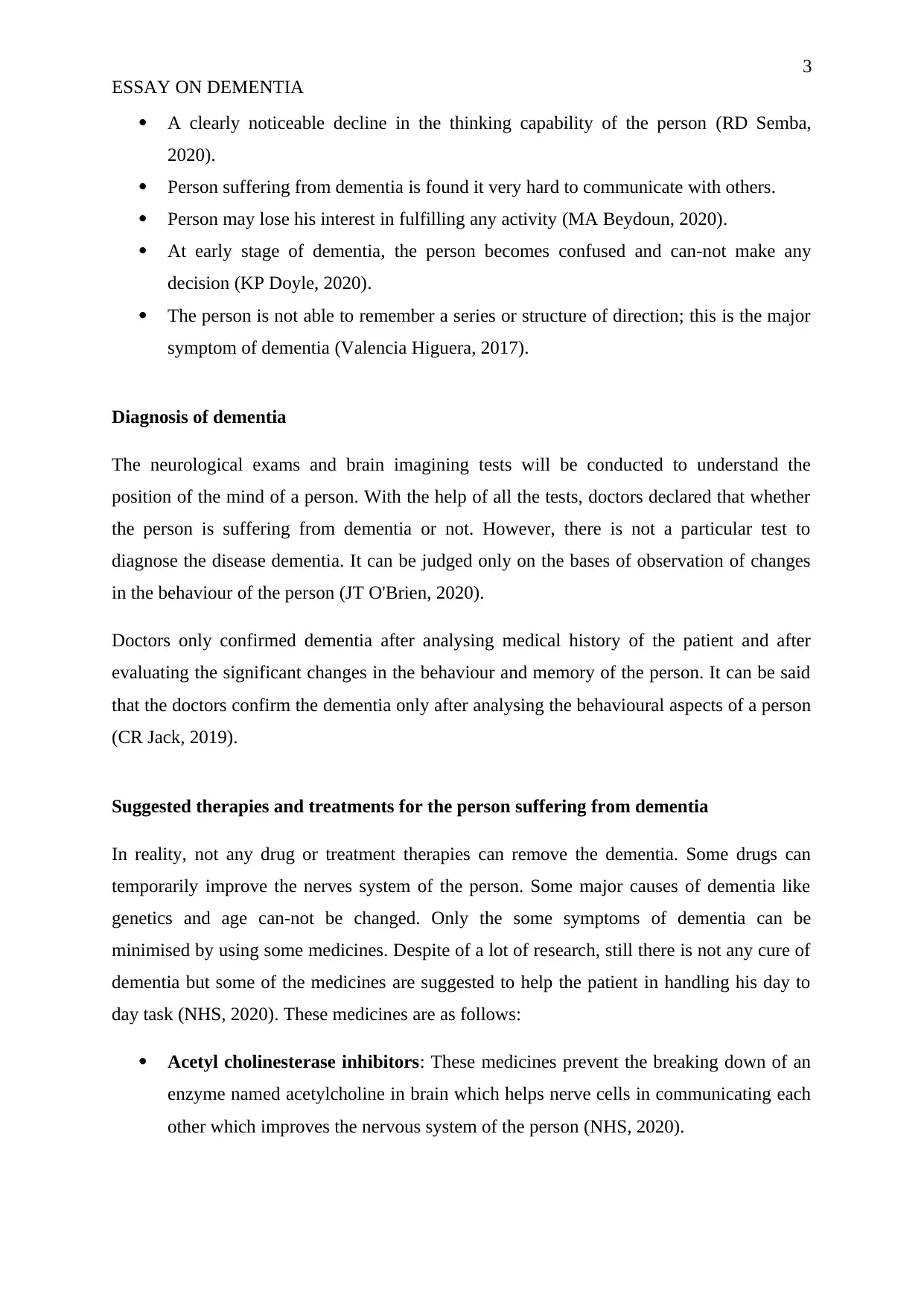
3
ESSAY ON DEMENTIA
A clearly noticeable decline in the thinking capability of the person (RD Semba,
2020).
Person suffering from dementia is found it very hard to communicate with others.
Person may lose his interest in fulfilling any activity (MA Beydoun, 2020).
At early stage of dementia, the person becomes confused and can-not make any
decision (KP Doyle, 2020).
The person is not able to remember a series or structure of direction; this is the major
symptom of dementia (Valencia Higuera, 2017).
Diagnosis of dementia
The neurological exams and brain imagining tests will be conducted to understand the
position of the mind of a person. With the help of all the tests, doctors declared that whether
the person is suffering from dementia or not. However, there is not a particular test to
diagnose the disease dementia. It can be judged only on the bases of observation of changes
in the behaviour of the person (JT O'Brien, 2020).
Doctors only confirmed dementia after analysing medical history of the patient and after
evaluating the significant changes in the behaviour and memory of the person. It can be said
that the doctors confirm the dementia only after analysing the behavioural aspects of a person
(CR Jack, 2019).
Suggested therapies and treatments for the person suffering from dementia
In reality, not any drug or treatment therapies can remove the dementia. Some drugs can
temporarily improve the nerves system of the person. Some major causes of dementia like
genetics and age can-not be changed. Only the some symptoms of dementia can be
minimised by using some medicines. Despite of a lot of research, still there is not any cure of
dementia but some of the medicines are suggested to help the patient in handling his day to
day task (NHS, 2020). These medicines are as follows:
Acetyl cholinesterase inhibitors: These medicines prevent the breaking down of an
enzyme named acetylcholine in brain which helps nerve cells in communicating each
other which improves the nervous system of the person (NHS, 2020).
ESSAY ON DEMENTIA
A clearly noticeable decline in the thinking capability of the person (RD Semba,
2020).
Person suffering from dementia is found it very hard to communicate with others.
Person may lose his interest in fulfilling any activity (MA Beydoun, 2020).
At early stage of dementia, the person becomes confused and can-not make any
decision (KP Doyle, 2020).
The person is not able to remember a series or structure of direction; this is the major
symptom of dementia (Valencia Higuera, 2017).
Diagnosis of dementia
The neurological exams and brain imagining tests will be conducted to understand the
position of the mind of a person. With the help of all the tests, doctors declared that whether
the person is suffering from dementia or not. However, there is not a particular test to
diagnose the disease dementia. It can be judged only on the bases of observation of changes
in the behaviour of the person (JT O'Brien, 2020).
Doctors only confirmed dementia after analysing medical history of the patient and after
evaluating the significant changes in the behaviour and memory of the person. It can be said
that the doctors confirm the dementia only after analysing the behavioural aspects of a person
(CR Jack, 2019).
Suggested therapies and treatments for the person suffering from dementia
In reality, not any drug or treatment therapies can remove the dementia. Some drugs can
temporarily improve the nerves system of the person. Some major causes of dementia like
genetics and age can-not be changed. Only the some symptoms of dementia can be
minimised by using some medicines. Despite of a lot of research, still there is not any cure of
dementia but some of the medicines are suggested to help the patient in handling his day to
day task (NHS, 2020). These medicines are as follows:
Acetyl cholinesterase inhibitors: These medicines prevent the breaking down of an
enzyme named acetylcholine in brain which helps nerve cells in communicating each
other which improves the nervous system of the person (NHS, 2020).
Paraphrase This Document
Need a fresh take? Get an instant paraphrase of this document with our AI Paraphraser
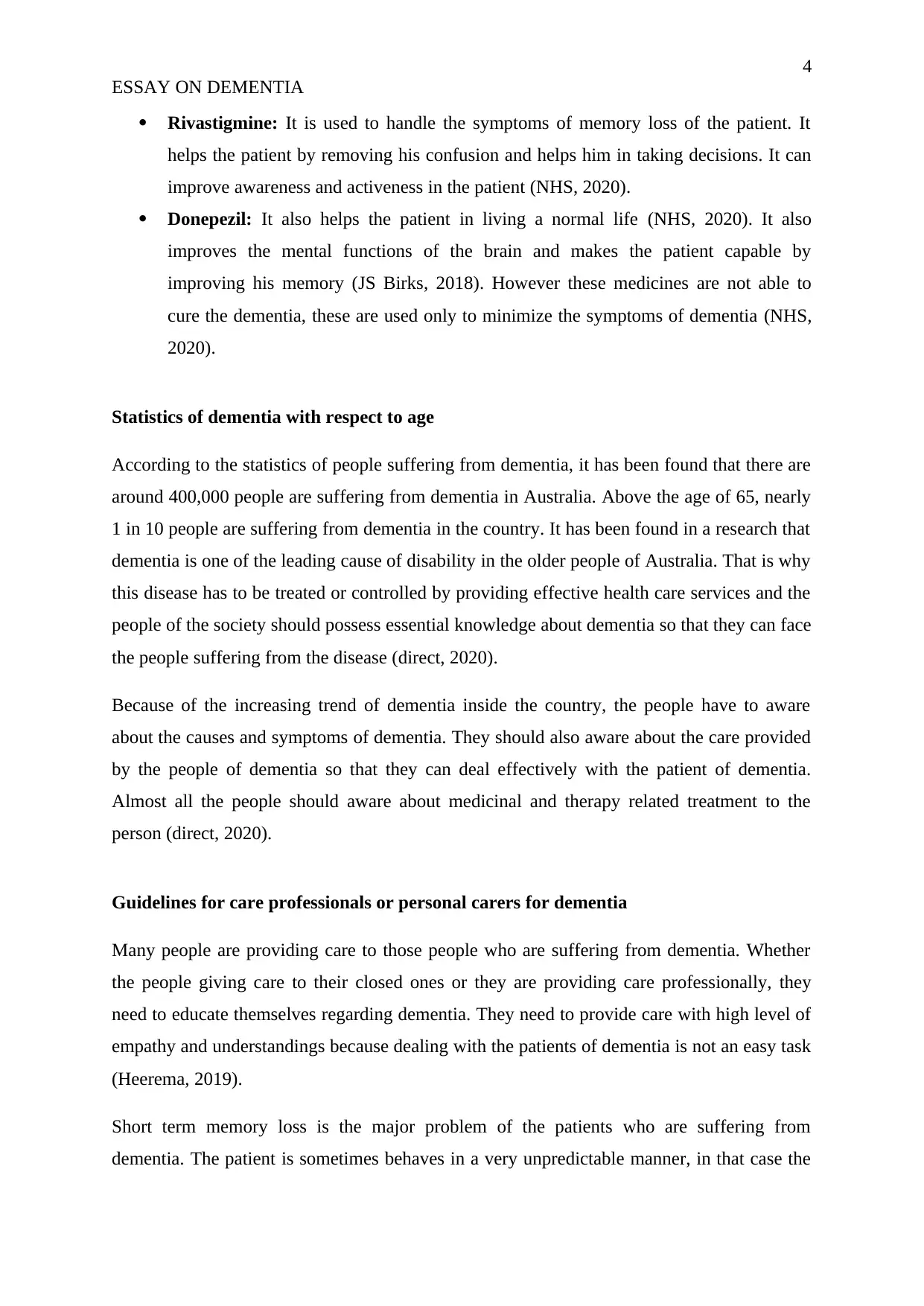
4
ESSAY ON DEMENTIA
Rivastigmine: It is used to handle the symptoms of memory loss of the patient. It
helps the patient by removing his confusion and helps him in taking decisions. It can
improve awareness and activeness in the patient (NHS, 2020).
Donepezil: It also helps the patient in living a normal life (NHS, 2020). It also
improves the mental functions of the brain and makes the patient capable by
improving his memory (JS Birks, 2018). However these medicines are not able to
cure the dementia, these are used only to minimize the symptoms of dementia (NHS,
2020).
Statistics of dementia with respect to age
According to the statistics of people suffering from dementia, it has been found that there are
around 400,000 people are suffering from dementia in Australia. Above the age of 65, nearly
1 in 10 people are suffering from dementia in the country. It has been found in a research that
dementia is one of the leading cause of disability in the older people of Australia. That is why
this disease has to be treated or controlled by providing effective health care services and the
people of the society should possess essential knowledge about dementia so that they can face
the people suffering from the disease (direct, 2020).
Because of the increasing trend of dementia inside the country, the people have to aware
about the causes and symptoms of dementia. They should also aware about the care provided
by the people of dementia so that they can deal effectively with the patient of dementia.
Almost all the people should aware about medicinal and therapy related treatment to the
person (direct, 2020).
Guidelines for care professionals or personal carers for dementia
Many people are providing care to those people who are suffering from dementia. Whether
the people giving care to their closed ones or they are providing care professionally, they
need to educate themselves regarding dementia. They need to provide care with high level of
empathy and understandings because dealing with the patients of dementia is not an easy task
(Heerema, 2019).
Short term memory loss is the major problem of the patients who are suffering from
dementia. The patient is sometimes behaves in a very unpredictable manner, in that case the
ESSAY ON DEMENTIA
Rivastigmine: It is used to handle the symptoms of memory loss of the patient. It
helps the patient by removing his confusion and helps him in taking decisions. It can
improve awareness and activeness in the patient (NHS, 2020).
Donepezil: It also helps the patient in living a normal life (NHS, 2020). It also
improves the mental functions of the brain and makes the patient capable by
improving his memory (JS Birks, 2018). However these medicines are not able to
cure the dementia, these are used only to minimize the symptoms of dementia (NHS,
2020).
Statistics of dementia with respect to age
According to the statistics of people suffering from dementia, it has been found that there are
around 400,000 people are suffering from dementia in Australia. Above the age of 65, nearly
1 in 10 people are suffering from dementia in the country. It has been found in a research that
dementia is one of the leading cause of disability in the older people of Australia. That is why
this disease has to be treated or controlled by providing effective health care services and the
people of the society should possess essential knowledge about dementia so that they can face
the people suffering from the disease (direct, 2020).
Because of the increasing trend of dementia inside the country, the people have to aware
about the causes and symptoms of dementia. They should also aware about the care provided
by the people of dementia so that they can deal effectively with the patient of dementia.
Almost all the people should aware about medicinal and therapy related treatment to the
person (direct, 2020).
Guidelines for care professionals or personal carers for dementia
Many people are providing care to those people who are suffering from dementia. Whether
the people giving care to their closed ones or they are providing care professionally, they
need to educate themselves regarding dementia. They need to provide care with high level of
empathy and understandings because dealing with the patients of dementia is not an easy task
(Heerema, 2019).
Short term memory loss is the major problem of the patients who are suffering from
dementia. The patient is sometimes behaves in a very unpredictable manner, in that case the
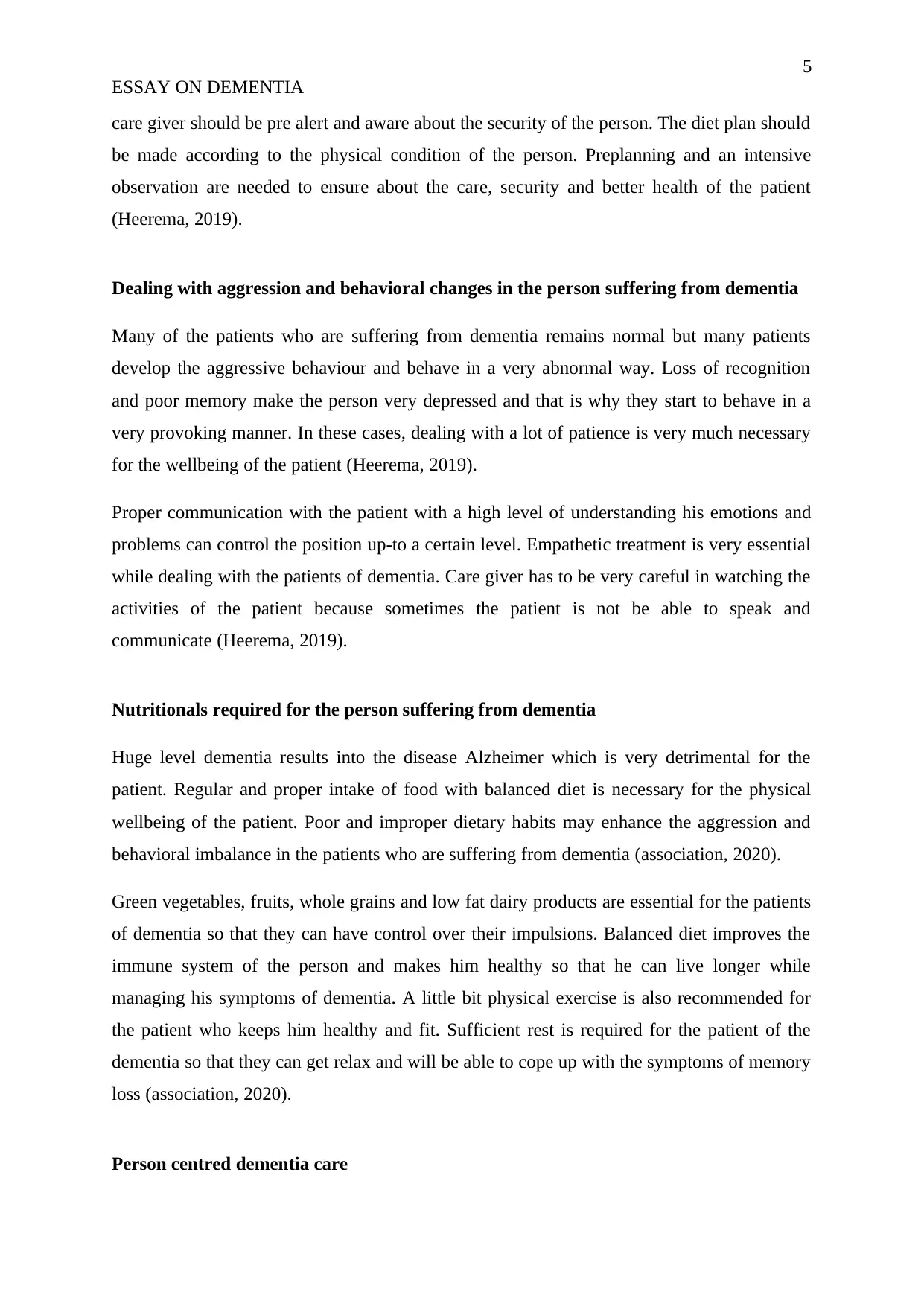
5
ESSAY ON DEMENTIA
care giver should be pre alert and aware about the security of the person. The diet plan should
be made according to the physical condition of the person. Preplanning and an intensive
observation are needed to ensure about the care, security and better health of the patient
(Heerema, 2019).
Dealing with aggression and behavioral changes in the person suffering from dementia
Many of the patients who are suffering from dementia remains normal but many patients
develop the aggressive behaviour and behave in a very abnormal way. Loss of recognition
and poor memory make the person very depressed and that is why they start to behave in a
very provoking manner. In these cases, dealing with a lot of patience is very much necessary
for the wellbeing of the patient (Heerema, 2019).
Proper communication with the patient with a high level of understanding his emotions and
problems can control the position up-to a certain level. Empathetic treatment is very essential
while dealing with the patients of dementia. Care giver has to be very careful in watching the
activities of the patient because sometimes the patient is not be able to speak and
communicate (Heerema, 2019).
Nutritionals required for the person suffering from dementia
Huge level dementia results into the disease Alzheimer which is very detrimental for the
patient. Regular and proper intake of food with balanced diet is necessary for the physical
wellbeing of the patient. Poor and improper dietary habits may enhance the aggression and
behavioral imbalance in the patients who are suffering from dementia (association, 2020).
Green vegetables, fruits, whole grains and low fat dairy products are essential for the patients
of dementia so that they can have control over their impulsions. Balanced diet improves the
immune system of the person and makes him healthy so that he can live longer while
managing his symptoms of dementia. A little bit physical exercise is also recommended for
the patient who keeps him healthy and fit. Sufficient rest is required for the patient of the
dementia so that they can get relax and will be able to cope up with the symptoms of memory
loss (association, 2020).
Person centred dementia care
ESSAY ON DEMENTIA
care giver should be pre alert and aware about the security of the person. The diet plan should
be made according to the physical condition of the person. Preplanning and an intensive
observation are needed to ensure about the care, security and better health of the patient
(Heerema, 2019).
Dealing with aggression and behavioral changes in the person suffering from dementia
Many of the patients who are suffering from dementia remains normal but many patients
develop the aggressive behaviour and behave in a very abnormal way. Loss of recognition
and poor memory make the person very depressed and that is why they start to behave in a
very provoking manner. In these cases, dealing with a lot of patience is very much necessary
for the wellbeing of the patient (Heerema, 2019).
Proper communication with the patient with a high level of understanding his emotions and
problems can control the position up-to a certain level. Empathetic treatment is very essential
while dealing with the patients of dementia. Care giver has to be very careful in watching the
activities of the patient because sometimes the patient is not be able to speak and
communicate (Heerema, 2019).
Nutritionals required for the person suffering from dementia
Huge level dementia results into the disease Alzheimer which is very detrimental for the
patient. Regular and proper intake of food with balanced diet is necessary for the physical
wellbeing of the patient. Poor and improper dietary habits may enhance the aggression and
behavioral imbalance in the patients who are suffering from dementia (association, 2020).
Green vegetables, fruits, whole grains and low fat dairy products are essential for the patients
of dementia so that they can have control over their impulsions. Balanced diet improves the
immune system of the person and makes him healthy so that he can live longer while
managing his symptoms of dementia. A little bit physical exercise is also recommended for
the patient who keeps him healthy and fit. Sufficient rest is required for the patient of the
dementia so that they can get relax and will be able to cope up with the symptoms of memory
loss (association, 2020).
Person centred dementia care
⊘ This is a preview!⊘
Do you want full access?
Subscribe today to unlock all pages.

Trusted by 1+ million students worldwide
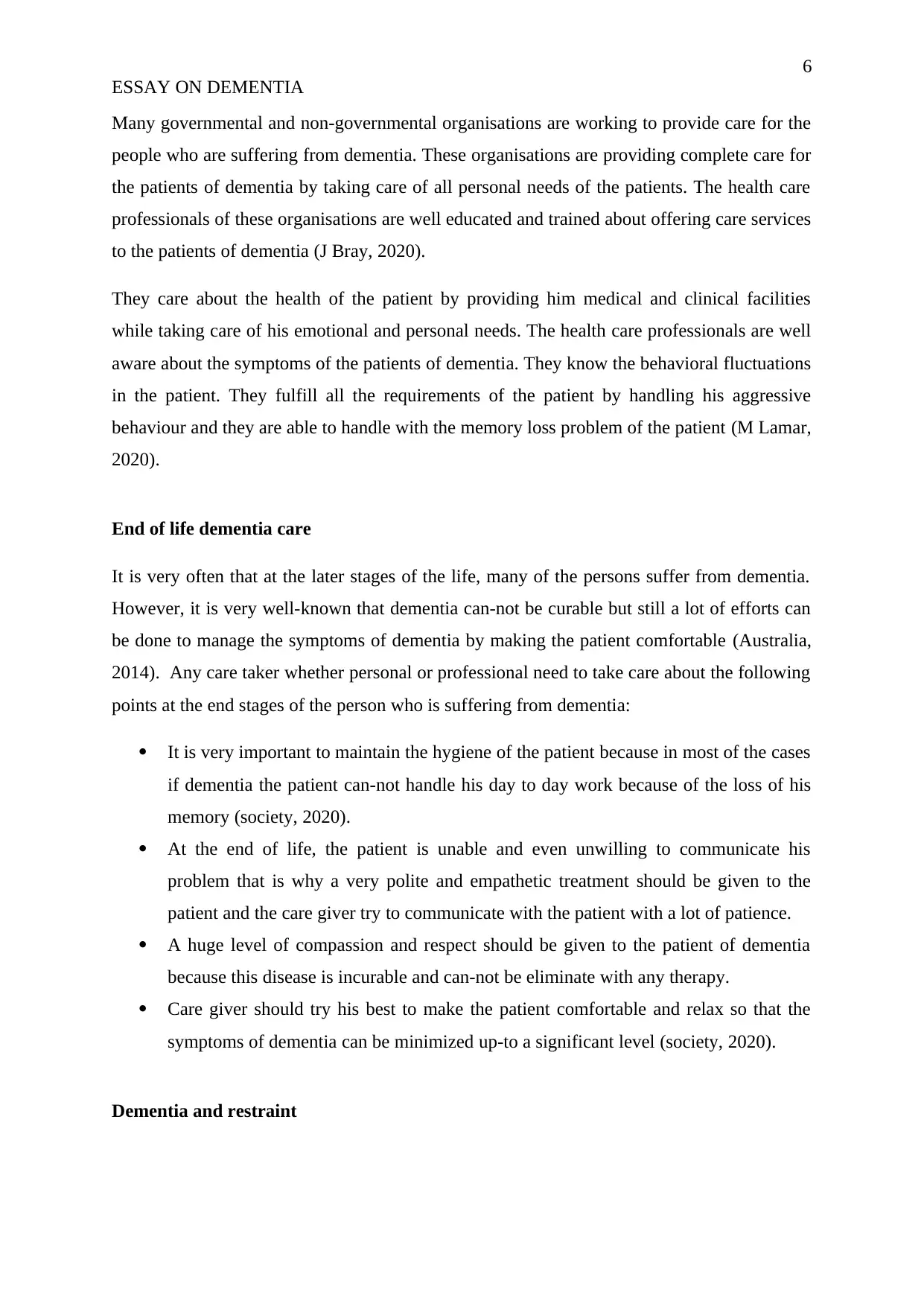
6
ESSAY ON DEMENTIA
Many governmental and non-governmental organisations are working to provide care for the
people who are suffering from dementia. These organisations are providing complete care for
the patients of dementia by taking care of all personal needs of the patients. The health care
professionals of these organisations are well educated and trained about offering care services
to the patients of dementia (J Bray, 2020).
They care about the health of the patient by providing him medical and clinical facilities
while taking care of his emotional and personal needs. The health care professionals are well
aware about the symptoms of the patients of dementia. They know the behavioral fluctuations
in the patient. They fulfill all the requirements of the patient by handling his aggressive
behaviour and they are able to handle with the memory loss problem of the patient (M Lamar,
2020).
End of life dementia care
It is very often that at the later stages of the life, many of the persons suffer from dementia.
However, it is very well-known that dementia can-not be curable but still a lot of efforts can
be done to manage the symptoms of dementia by making the patient comfortable (Australia,
2014). Any care taker whether personal or professional need to take care about the following
points at the end stages of the person who is suffering from dementia:
It is very important to maintain the hygiene of the patient because in most of the cases
if dementia the patient can-not handle his day to day work because of the loss of his
memory (society, 2020).
At the end of life, the patient is unable and even unwilling to communicate his
problem that is why a very polite and empathetic treatment should be given to the
patient and the care giver try to communicate with the patient with a lot of patience.
A huge level of compassion and respect should be given to the patient of dementia
because this disease is incurable and can-not be eliminate with any therapy.
Care giver should try his best to make the patient comfortable and relax so that the
symptoms of dementia can be minimized up-to a significant level (society, 2020).
Dementia and restraint
ESSAY ON DEMENTIA
Many governmental and non-governmental organisations are working to provide care for the
people who are suffering from dementia. These organisations are providing complete care for
the patients of dementia by taking care of all personal needs of the patients. The health care
professionals of these organisations are well educated and trained about offering care services
to the patients of dementia (J Bray, 2020).
They care about the health of the patient by providing him medical and clinical facilities
while taking care of his emotional and personal needs. The health care professionals are well
aware about the symptoms of the patients of dementia. They know the behavioral fluctuations
in the patient. They fulfill all the requirements of the patient by handling his aggressive
behaviour and they are able to handle with the memory loss problem of the patient (M Lamar,
2020).
End of life dementia care
It is very often that at the later stages of the life, many of the persons suffer from dementia.
However, it is very well-known that dementia can-not be curable but still a lot of efforts can
be done to manage the symptoms of dementia by making the patient comfortable (Australia,
2014). Any care taker whether personal or professional need to take care about the following
points at the end stages of the person who is suffering from dementia:
It is very important to maintain the hygiene of the patient because in most of the cases
if dementia the patient can-not handle his day to day work because of the loss of his
memory (society, 2020).
At the end of life, the patient is unable and even unwilling to communicate his
problem that is why a very polite and empathetic treatment should be given to the
patient and the care giver try to communicate with the patient with a lot of patience.
A huge level of compassion and respect should be given to the patient of dementia
because this disease is incurable and can-not be eliminate with any therapy.
Care giver should try his best to make the patient comfortable and relax so that the
symptoms of dementia can be minimized up-to a significant level (society, 2020).
Dementia and restraint
Paraphrase This Document
Need a fresh take? Get an instant paraphrase of this document with our AI Paraphraser
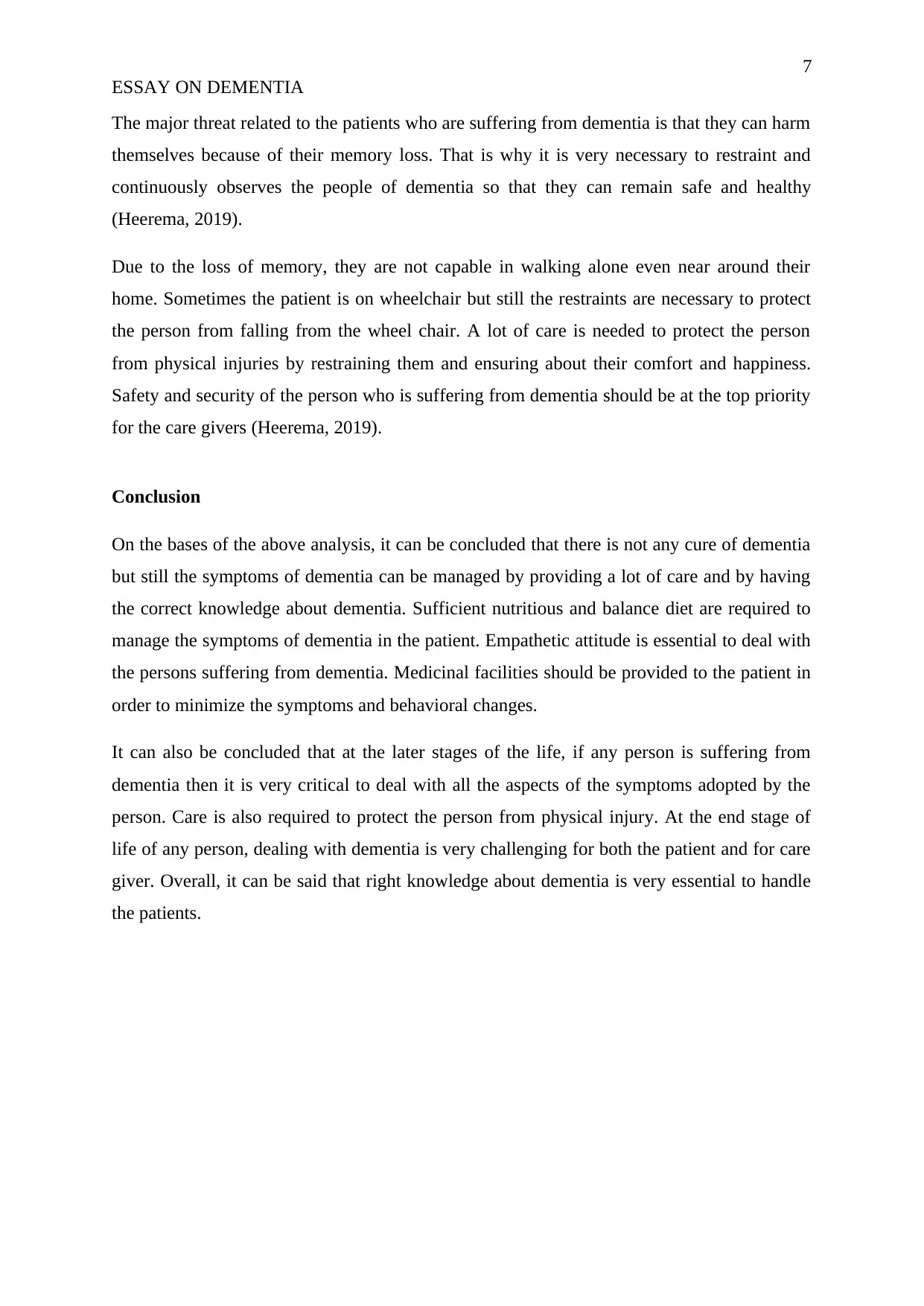
7
ESSAY ON DEMENTIA
The major threat related to the patients who are suffering from dementia is that they can harm
themselves because of their memory loss. That is why it is very necessary to restraint and
continuously observes the people of dementia so that they can remain safe and healthy
(Heerema, 2019).
Due to the loss of memory, they are not capable in walking alone even near around their
home. Sometimes the patient is on wheelchair but still the restraints are necessary to protect
the person from falling from the wheel chair. A lot of care is needed to protect the person
from physical injuries by restraining them and ensuring about their comfort and happiness.
Safety and security of the person who is suffering from dementia should be at the top priority
for the care givers (Heerema, 2019).
Conclusion
On the bases of the above analysis, it can be concluded that there is not any cure of dementia
but still the symptoms of dementia can be managed by providing a lot of care and by having
the correct knowledge about dementia. Sufficient nutritious and balance diet are required to
manage the symptoms of dementia in the patient. Empathetic attitude is essential to deal with
the persons suffering from dementia. Medicinal facilities should be provided to the patient in
order to minimize the symptoms and behavioral changes.
It can also be concluded that at the later stages of the life, if any person is suffering from
dementia then it is very critical to deal with all the aspects of the symptoms adopted by the
person. Care is also required to protect the person from physical injury. At the end stage of
life of any person, dealing with dementia is very challenging for both the patient and for care
giver. Overall, it can be said that right knowledge about dementia is very essential to handle
the patients.
ESSAY ON DEMENTIA
The major threat related to the patients who are suffering from dementia is that they can harm
themselves because of their memory loss. That is why it is very necessary to restraint and
continuously observes the people of dementia so that they can remain safe and healthy
(Heerema, 2019).
Due to the loss of memory, they are not capable in walking alone even near around their
home. Sometimes the patient is on wheelchair but still the restraints are necessary to protect
the person from falling from the wheel chair. A lot of care is needed to protect the person
from physical injuries by restraining them and ensuring about their comfort and happiness.
Safety and security of the person who is suffering from dementia should be at the top priority
for the care givers (Heerema, 2019).
Conclusion
On the bases of the above analysis, it can be concluded that there is not any cure of dementia
but still the symptoms of dementia can be managed by providing a lot of care and by having
the correct knowledge about dementia. Sufficient nutritious and balance diet are required to
manage the symptoms of dementia in the patient. Empathetic attitude is essential to deal with
the persons suffering from dementia. Medicinal facilities should be provided to the patient in
order to minimize the symptoms and behavioral changes.
It can also be concluded that at the later stages of the life, if any person is suffering from
dementia then it is very critical to deal with all the aspects of the symptoms adopted by the
person. Care is also required to protect the person from physical injury. At the end stage of
life of any person, dealing with dementia is very challenging for both the patient and for care
giver. Overall, it can be said that right knowledge about dementia is very essential to handle
the patients.
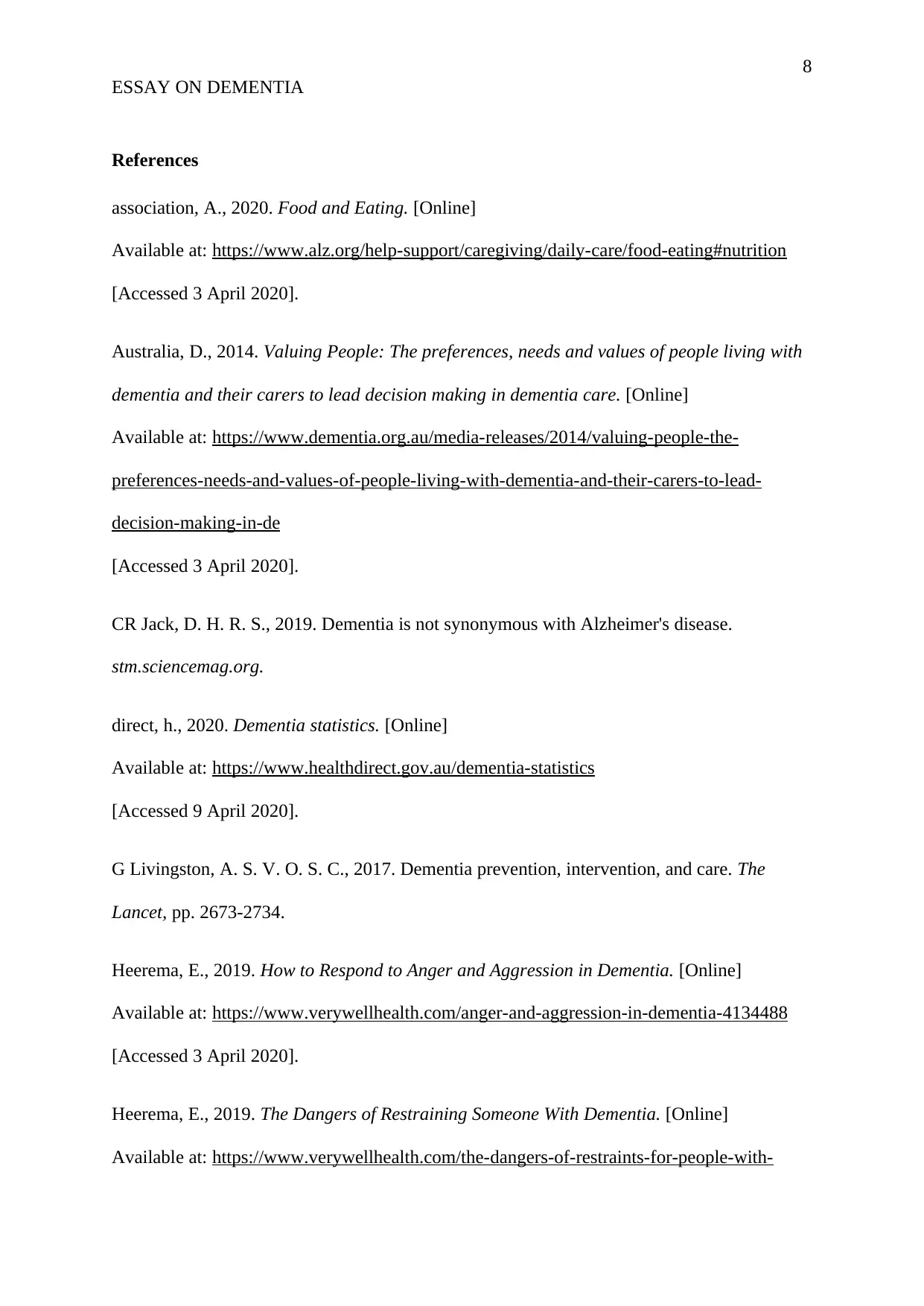
8
ESSAY ON DEMENTIA
References
association, A., 2020. Food and Eating. [Online]
Available at: https://www.alz.org/help-support/caregiving/daily-care/food-eating#nutrition
[Accessed 3 April 2020].
Australia, D., 2014. Valuing People: The preferences, needs and values of people living with
dementia and their carers to lead decision making in dementia care. [Online]
Available at: https://www.dementia.org.au/media-releases/2014/valuing-people-the-
preferences-needs-and-values-of-people-living-with-dementia-and-their-carers-to-lead-
decision-making-in-de
[Accessed 3 April 2020].
CR Jack, D. H. R. S., 2019. Dementia is not synonymous with Alzheimer's disease.
stm.sciencemag.org.
direct, h., 2020. Dementia statistics. [Online]
Available at: https://www.healthdirect.gov.au/dementia-statistics
[Accessed 9 April 2020].
G Livingston, A. S. V. O. S. C., 2017. Dementia prevention, intervention, and care. The
Lancet, pp. 2673-2734.
Heerema, E., 2019. How to Respond to Anger and Aggression in Dementia. [Online]
Available at: https://www.verywellhealth.com/anger-and-aggression-in-dementia-4134488
[Accessed 3 April 2020].
Heerema, E., 2019. The Dangers of Restraining Someone With Dementia. [Online]
Available at: https://www.verywellhealth.com/the-dangers-of-restraints-for-people-with-
ESSAY ON DEMENTIA
References
association, A., 2020. Food and Eating. [Online]
Available at: https://www.alz.org/help-support/caregiving/daily-care/food-eating#nutrition
[Accessed 3 April 2020].
Australia, D., 2014. Valuing People: The preferences, needs and values of people living with
dementia and their carers to lead decision making in dementia care. [Online]
Available at: https://www.dementia.org.au/media-releases/2014/valuing-people-the-
preferences-needs-and-values-of-people-living-with-dementia-and-their-carers-to-lead-
decision-making-in-de
[Accessed 3 April 2020].
CR Jack, D. H. R. S., 2019. Dementia is not synonymous with Alzheimer's disease.
stm.sciencemag.org.
direct, h., 2020. Dementia statistics. [Online]
Available at: https://www.healthdirect.gov.au/dementia-statistics
[Accessed 9 April 2020].
G Livingston, A. S. V. O. S. C., 2017. Dementia prevention, intervention, and care. The
Lancet, pp. 2673-2734.
Heerema, E., 2019. How to Respond to Anger and Aggression in Dementia. [Online]
Available at: https://www.verywellhealth.com/anger-and-aggression-in-dementia-4134488
[Accessed 3 April 2020].
Heerema, E., 2019. The Dangers of Restraining Someone With Dementia. [Online]
Available at: https://www.verywellhealth.com/the-dangers-of-restraints-for-people-with-
⊘ This is a preview!⊘
Do you want full access?
Subscribe today to unlock all pages.

Trusted by 1+ million students worldwide
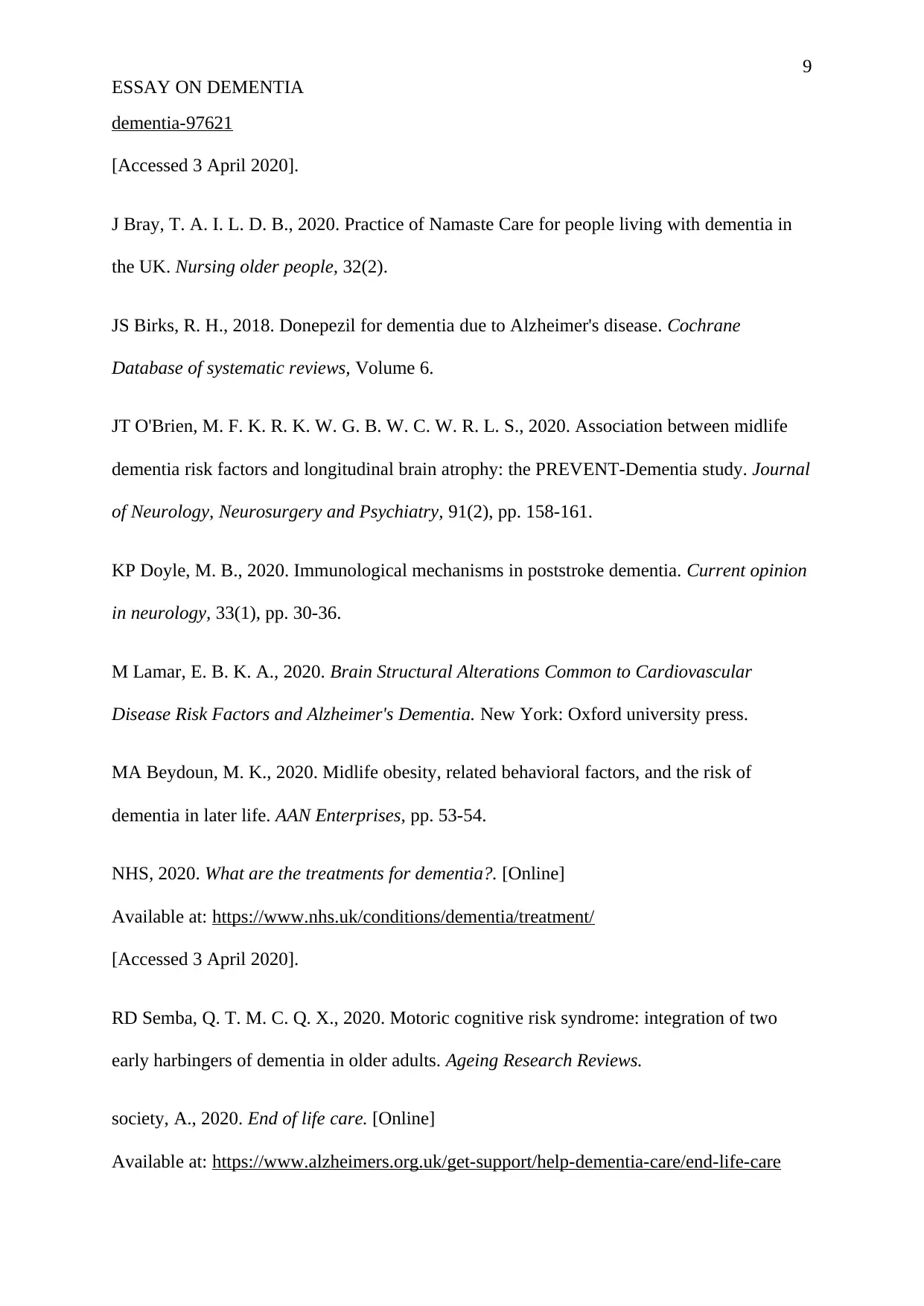
9
ESSAY ON DEMENTIA
dementia-97621
[Accessed 3 April 2020].
J Bray, T. A. I. L. D. B., 2020. Practice of Namaste Care for people living with dementia in
the UK. Nursing older people, 32(2).
JS Birks, R. H., 2018. Donepezil for dementia due to Alzheimer's disease. Cochrane
Database of systematic reviews, Volume 6.
JT O'Brien, M. F. K. R. K. W. G. B. W. C. W. R. L. S., 2020. Association between midlife
dementia risk factors and longitudinal brain atrophy: the PREVENT-Dementia study. Journal
of Neurology, Neurosurgery and Psychiatry, 91(2), pp. 158-161.
KP Doyle, M. B., 2020. Immunological mechanisms in poststroke dementia. Current opinion
in neurology, 33(1), pp. 30-36.
M Lamar, E. B. K. A., 2020. Brain Structural Alterations Common to Cardiovascular
Disease Risk Factors and Alzheimer's Dementia. New York: Oxford university press.
MA Beydoun, M. K., 2020. Midlife obesity, related behavioral factors, and the risk of
dementia in later life. AAN Enterprises, pp. 53-54.
NHS, 2020. What are the treatments for dementia?. [Online]
Available at: https://www.nhs.uk/conditions/dementia/treatment/
[Accessed 3 April 2020].
RD Semba, Q. T. M. C. Q. X., 2020. Motoric cognitive risk syndrome: integration of two
early harbingers of dementia in older adults. Ageing Research Reviews.
society, A., 2020. End of life care. [Online]
Available at: https://www.alzheimers.org.uk/get-support/help-dementia-care/end-life-care
ESSAY ON DEMENTIA
dementia-97621
[Accessed 3 April 2020].
J Bray, T. A. I. L. D. B., 2020. Practice of Namaste Care for people living with dementia in
the UK. Nursing older people, 32(2).
JS Birks, R. H., 2018. Donepezil for dementia due to Alzheimer's disease. Cochrane
Database of systematic reviews, Volume 6.
JT O'Brien, M. F. K. R. K. W. G. B. W. C. W. R. L. S., 2020. Association between midlife
dementia risk factors and longitudinal brain atrophy: the PREVENT-Dementia study. Journal
of Neurology, Neurosurgery and Psychiatry, 91(2), pp. 158-161.
KP Doyle, M. B., 2020. Immunological mechanisms in poststroke dementia. Current opinion
in neurology, 33(1), pp. 30-36.
M Lamar, E. B. K. A., 2020. Brain Structural Alterations Common to Cardiovascular
Disease Risk Factors and Alzheimer's Dementia. New York: Oxford university press.
MA Beydoun, M. K., 2020. Midlife obesity, related behavioral factors, and the risk of
dementia in later life. AAN Enterprises, pp. 53-54.
NHS, 2020. What are the treatments for dementia?. [Online]
Available at: https://www.nhs.uk/conditions/dementia/treatment/
[Accessed 3 April 2020].
RD Semba, Q. T. M. C. Q. X., 2020. Motoric cognitive risk syndrome: integration of two
early harbingers of dementia in older adults. Ageing Research Reviews.
society, A., 2020. End of life care. [Online]
Available at: https://www.alzheimers.org.uk/get-support/help-dementia-care/end-life-care
Paraphrase This Document
Need a fresh take? Get an instant paraphrase of this document with our AI Paraphraser

10
ESSAY ON DEMENTIA
[Accessed 3 April 2020].
Valencia Higuera, M. E. E., 2017. Symptoms of dementia. [Online]
Available at: https://www.healthline.com/health/dementia/early-warning-signs#when-to-see-
a-doctor
[Accessed 3 April 2020].
ESSAY ON DEMENTIA
[Accessed 3 April 2020].
Valencia Higuera, M. E. E., 2017. Symptoms of dementia. [Online]
Available at: https://www.healthline.com/health/dementia/early-warning-signs#when-to-see-
a-doctor
[Accessed 3 April 2020].
1 out of 11
Related Documents
Your All-in-One AI-Powered Toolkit for Academic Success.
+13062052269
info@desklib.com
Available 24*7 on WhatsApp / Email
![[object Object]](/_next/static/media/star-bottom.7253800d.svg)
Unlock your academic potential
Copyright © 2020–2026 A2Z Services. All Rights Reserved. Developed and managed by ZUCOL.





